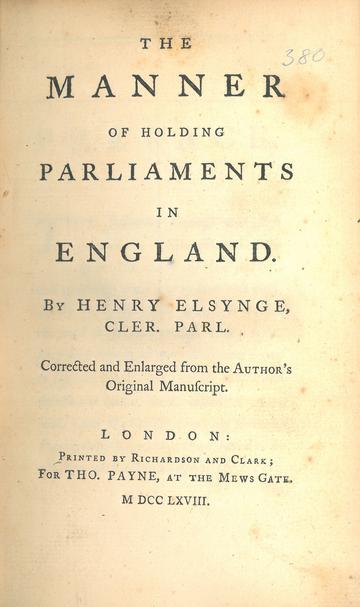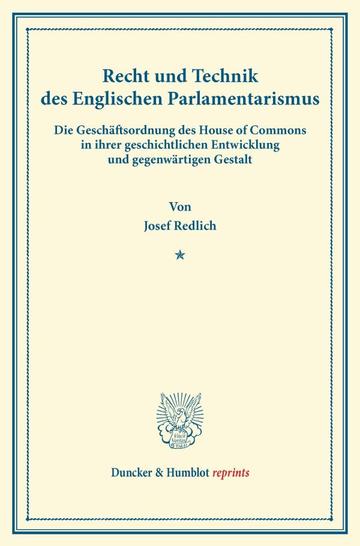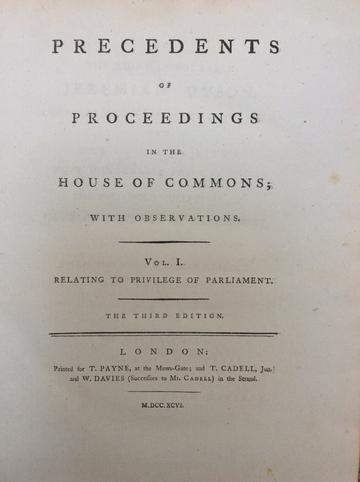Rhetoric of Debate: A Parliamentary Innovation
Works on parliamentary eloquence, oratory or rhetoric flourished in Britain and France from the early nineteenth to the early twentieth century. Collections of parliamentary speeches portrayed late eighteenth-century Britain as the golden age of parliamentary oratory: Lord Chatham (William Pitt the elder), Edmund Burke, Richard Sheridan, Charles James Fox and William Pitt the younger were the canonised masters of the genre. Yet eighteenth-century school rhetoricians such as Hugh Blair had still regarded ancient oratory as very much superior to contemporary parliamentary speaking. Twentieth-century rhetorical scholars, by contrast, hardly speak of parliaments.
Why was the originality of parliamentary rhetoric no longer recognised? The deliberative character separates the genre of parliamentary rhetoric from forensic court judgements, diplomatic negotiations and epideictic acclamations: it concerns the direction of policy and the form of the polity. Classical Greek and Roman deliberative rhetoric chiefly concerned the quality of individual speeches and their effects upon the audience, and did not recognise the debate itself as something distinctive. As I have argued in From Oratory to Debate, and as I will elaborate upon here, the key feature of modern parliamentary rhetoric is not the speech itself but the debate among members of the assembly.

Title page of Henry Elsynge’s The Manner of Holding Parliaments in England, London, 1768.
A parliamentary way of acting and thinking
Parliaments are an invention of medieval and early modern Europe. This is connected to both what Quentin Skinner has called ‘Renaissance rhetorical culture’ as well as to the formation of a procedural style of doing politics. In his Forensic Shakespeare, Skinner illustrates this link between court procedure and forensic rhetoric. For parliamentary rhetoric procedural commentaries have played a decisive role. The genre was created from the Elizabethan to the Cromwellian period by members of parliament such as John Hooker or William Hakewill or parliamentary clerks such as Henry Elsynge sr. and Henry Scobell. By making parliament’s rules and conventions governing debates available to its members, these commentaries played their part in defending parliament against Tudor and Stuart kings. They set out the framework for debate, identified and analysed the repertoire of the parliamentary process and discussed the ways of conducting debate. Their work served as a background for the later commentaries of John Hatsell, Jeremy Bentham and Thomas Erskine May, classically presented by Josef Redlich Recht und Technik des Englischen Parlamentarismus. Through them, the Westminster type of ‘parliamentary debate culture’ was spread around the world.

Title page of Josef Redlich’s Recht und Technik des englischen Parlamentarismus, originally published in Leipzig, 1905, and translated into English under the title History of Parliamentary Procedure.
Strangely enough, scholars of rhetoric and political theorists have hardly discussed these commentaries on parliamentary procedure. The commentaries can help us, however, better to understand how the procedural character of early modern parliamentary speaking changed the deliberative genre of rhetoric. Indeed, it was this relationship between procedure and parliamentary language that made the Westminster parliament a paradigm and allows us today to speak of a distinct parliamentary way of both acting and thinking politically, as I do in The Politics of Parliamentary Procedure.
During the Renaissance rhetorical manuals and textbooks were widely taught at schools and universities across Europe. They repeated and reinterpreted ancient examples to illustrate the tropes, figures and schemes of argumentation. Towards the end of the sixteenth century, this rhetorical culture was built into the struggles between parliaments and monarchical powers in England, as Markku Peltonen emphasises in Rhetoric, politics and popularity in pre-revolutionary England.
The deliberative genre of rhetoric and parliamentary politics share the principle of debate, of in utramque partem disputare. Whereas classical rhetoric aimed at ‘speaking winningly’, parliamentary speaking presupposes a willingness to listen to the other side: audiatur et altera pars became a common principle of courts and parliaments in the early modern period. It recognised that for any motion on the parliamentary agenda, plausible counterarguments are possible, and the fate of the motion depends on the rhetorical competence of participants in the debate. The rhetorical vision of knowledge legitimises dissent. In fact, the parliamentary way of proceeding expects dissent in the debate, if only for the sake of argument. And so, the parliamentary procedure creates the occasion for inventing alternative perspectives, as well as for reconsidering the strengths and weaknesses of a motion under discussion.
An illuminating example of the rhetorical practices in the House of Commons are the maxims that MP William Georg Hamilton collected from the second half of the eighteenth century in Parliamentary Logick, which is indebted to ancient and Renaissance logic and rhetoric no less than Westminster procedure. The book contains a rich repertoire of rhetorical schemes for making ‘the weaker case stronger’. Nineteenth-century rhetoric was indebted to the resources of procedural commentaries. James de Mille in his The Elements of Rhetoric (1878) and Georg Jacob Holyoake with his Public Speaking and Debate (1897) emphasised that a question could not be properly understood without examining opposite points of view. I have written elsewhere of a ‘parliamentary theory of knowledge’, visible for example in John Stuart Mill’s On Liberty (1859) and Max Weber’s 1904 essay Die "Objektivität" sozialwissenschaftlier und sozialpolitischer Erkenntnis, which for my Die "Objektivität" als faires Spiel marks a reinterpretation of “objectivity” into a procedure of fair debate with Westminster parliament as a model. The parliamentary model has, as Taru Haapala has shown in her book Political Rhetoric in the Oxford and Cambridge Unions, also been applied by debating societies, associations and meetings
Fair play as an unwritten rule
Early modern parliamentary procedure and the rhetoric of debate further shared a non-partisan ideal: the result of debate should be left open. Their point was to enable arguments for and against the motion on the agenda to be heard on equal terms, corresponding to the old British principle of fair play. Parliamentary freedom of the members concerns freedom from dependence: what Quentin Skinner in Liberty before Liberalism calls the neo-Roman concept of liberty. According to this concept, a necessary condition for parliamentary debate is that members’ parliamentary judgement must be independent, both from the arbitrary power of the constituency electorate, and any political party or other interest group. Otherwise there is no willingness to listen to the other side and reconsider the strengths and weaknesses of a motion, nor to engage with new perspectives, nor the possibility of adapting one’s vote for the sake of achieving a majority.
Another characteristic of parliamentary debate is that it is not a single event but a sequence of interconnected opportunities to debate in both plenum and committee. The origins of this sequence of events lie in the traditional three readings of the bill, each from a different perspective, which allows a reconsideration of the pros and cons at each stage. Similarly, plenary and committee debates are regulated by different rules: the plenum is concerned with the principles of the motion, the committee with the details. In the committee, speeches can be more easily debated than in the plenum. At Westminster the plenum can resolve itself to a Committee of the whole House, with all members of the House debating according to committee rules.

Title page of John Hatsell’s Precedents of Proceedings in the House of Commons. With Observations, vol. 1, London, 1795 (originally published in 1775).
This entire sequence of events that constitutes the debate on a motion leading to a resolution, is the rhetorical core of parliamentary politics. Parliamentarians have, however, invented additional moves, including debating the agenda itself with distinct rules, or questions of order, such as not speaking to the matter or using ‘unparliamentary’ language. (I leave it to the reader to imagine what kind of language that might be). Parliamentarians can move for the adjournment of the debate to amend the motion or to close the debate. Opportunities for the Opposition and for backbenchers are available for initiating debate on the budget, international treaties, through questions to ministers, or a vote of no-confidence in the government (a key event for any parliamentary government). As emphasised in 1929 by Gilbert Campion in An Introduction to the Procedure of the House of Commons, as well as the classical three readings of the bill, there is a report stage in which amendments made in committee are discussed. Today, parliamentary debates frequently focus not on passing or rejecting a motion, but rather on passing the motion versus adopting the winning amendment to it.
Let me close by emphasising the scholarly value of recovering the parliamentary culture(s) of the past. After all, parliamentary politics is a politics of time. A motion is ‘present’ in parliament both as a matter of ongoing debate and ‘in possession of the House’ when an item is not yet decided or taken out of the agenda. Parliament must both spend sufficient time to deal thoroughly with the items, and save time, to arrive at a decision. Every step on the journey of a motion through the different stages of the parliamentary agenda is politically as important as the result of the final vote. The competence in playing with time is a major part of a politician’s parliamentary literacy. In a similar way, the ability to compare parliamentary cultures across time would be a major asset to the current literature on political and institutional and intellectual history.
Kari Palonen, Professor emeritus of Political Science, University of Jyväskylä.


